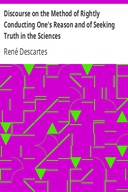Explore

Discourse on the Method of Rightly Conducting One's Reason and of Seeking Truth in the Sciences
René Descartes
1993
0 Ungluers have
Faved this Work
Login to Fave
The Discourse on the Method (French: Discours de la méthode) is a philosophical and autobiographical treatise published by René Descartes in 1637. Its full name is Discourse on the Method of Rightly Conducting One's Reason and of Seeking Truth in the Sciences (French title: Discours de la méthode pour bien conduire sa raison, et chercher la vérité dans les sciences). The Discourse on The Method is best known as the source of the famous quotation "Je pense, donc je suis" ("I think, therefore I am"), which occurs in Part IV of the work. (The similar statement in Latin, Cogito ergo sum, is found in Part I, §7 of Principles of Philosophy.)
The Discourse on the Method is one of the most influential works in the history of modern philosophy, and important to the development of natural sciences. In this work, Descartes tackles the problem of skepticism, which had previously been studied by Sextus Empiricus, Al-Ghazali and Michel de Montaigne. Descartes modified it to account for a truth he found to be incontrovertible. Descartes started his line of reasoning by doubting everything, so as to assess the world from a fresh perspective, clear of any preconceived notions.
The book was originally published in Leiden in the Netherlands. Later, it was translated into Latin and published in 1656 in Amsterdam. The book was intended as an introduction to three works Dioptrique, Météores and Géométrie. La Géométrie contains Descartes' first introduction of the Cartesian coordinate system. That the text was written and published in French rather than Latin, which was the language in which philosophical and scientific texts were most frequently written and published (as were most of Descartes' other works), is worth noting.
Together with Meditations on First Philosophy (Meditationes de Prima Philosophia), Principles of Philosophy (Principia philosophiae) and Rules for the Direction of the Mind (Regulae ad directionem ingenii), it forms the base of the epistemology known as Cartesianism.
From Wikipedia (CC BY-SA).
This book is included in Project Gutenberg.
Why read this book? Have your say.
You must be logged in to comment.
Rights Information
Are you the author or publisher of this work? If so, you can claim it as yours by registering as an Unglue.it rights holder.Downloads
This work has been downloaded 491 times via unglue.it ebook links.
- 44 - epub (0.2) (PD-US) at Github.
- 97 - mobi (0.2) (PD-US) at Github.
- 48 - pdf (0.2) (PD-US) at Github.
- 45 - epub (0.2) (PD-US) at Github.
- 47 - mobi (0.2) (PD-US) at Github.
- 51 - pdf (0.2) (PD-US) at Github.
- 61 - epub (PD-US) at Github.
- 45 - mobi (PD-US) at Github.
- 53 - pdf (PD-US) at Github.
Keywords
- B
- GITenberg
- Methodology
- Science -- Methodology
Links
web: http://www.gutenberg.org/ebooks/59Editions

